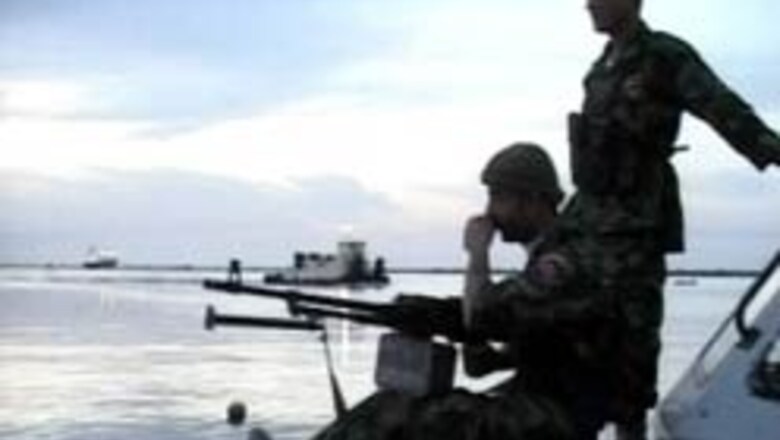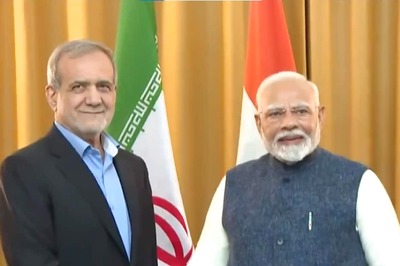
views
Tehran: Iran said on Monday it was questioning 15 British sailors and marines to determine if their alleged entry into Iranian waters was ''intentional or unintentional'' before deciding what to do with them - the first sign it could be seeking a way out of the standoff.
The two countries continued to disagree about where the military personnel were seized on Friday, with Britain insisting they were in Iraqi waters after searching a civilian cargo vessel and the Tehran regime saying it had proof they were in Iranian territory.
Britain's Defense Ministry said they were seized in the Shatt al-Arab, a waterway flowing into the Persian Gulf that marks the border between Iran and Iraq. But the dividing line in the waterway, known in Iran as the Arvand river, has long been disputed.
The Iranian emphasis Monday on the detainees' intent was a noticeable pullback from the certainty expressed Saturday by Iran's military chief, General Ali Reza Afshar. Afshar said then that the 15 confessed to ''aggression into the Islamic Republic of Iran's waters.''
Other Iranian officials suggested afterward that the Britons might be charged with a crime, presumably espionage or trespassing - for knowingly entering Iran's territorial waters.
Deputy Foreign Minister Mehzi Mostafavi took a softer line on Monday while saying that the 14 men and one woman were still being interrogated.
''It should become clear whether their entry was intentional or unintentional. After that is clarified, the necessary decision will be made,'' Mostafavi said.
The escalating tensions between Iran and the West pushed oil prices Monday to their highest level so far this year. Gasoline futures prices climbed above $2 a gallon to their highest level since last September.
Iran has refused to say where the captured Britons were being held or to allow British officials to speak with them, but assured the British ambassador to Tehran, Geoffrey Adams, that they were in good health.
PAGE_BREAK
During an official visit to Turkey on Monday, British Foreign Secretary Margaret Beckett called for Iran to allow access to the captives.
''We will continue to press the Iranian authorities until the incident has been resolved with the safe return of our personnel and their equipment,'' she said.
In London, Iranian Ambassador Rasoul Movahedian was summoned to the British Foreign Office for the third time since the standoff began. Lord Triesman, Foreign Office undersecretary, again demanded the safe return of the detained personnel, the Foreign Office said.
There were fears in Britain that the fate of the 15 could get caught up in the political tensions between Tehran and the West, including the dispute over Iran's nuclear program and accusations of Iranian help to Shiite militants in Iraq.
In particular, there were worries Iran might seek to use the prisoners as leverage in trying to get the US to free at least five Iranians detained in Iraq for allegedly being part of a Revolutionary Guard force that provides funds, weapons and training to Iraqi Shiite militias.
Mostafavi denied Iran was seeking a trade, but there were calls from elsewhere within Iran's leadership for the government to hold out for a swap.
A website run by Mohsen Rezaei, secretary of the Expediency Council and a former Revolutionary Guard commander, quoted an unidentified lawmaker as saying, ''If Iranian diplomats in Iraq have no security, there's no reason why we should forgive and turn a blind eye to aggressors into Iranian territories.''
Some members of the Iranian public also called for the Britishsailors and marines to be held and tried. Hundreds of Iranian students demonstrated near the coast to urge a tough stand in the confrontation with the West.
British leaders sought to play down fears the situation could escalate or become entangled with the other disputes.




















Comments
0 comment